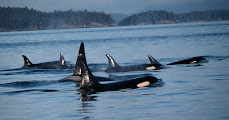Killer whales, also known as killer whales, are apex predators that play a vital role in the marine ecosystem. However, their hunting habits change along with changing ocean ecology. This is due to a number of factors, including climate change, pollution and overfishing.
Climate Change: Climate change is causing the oceans to warm and acidify. This disrupts the food chain and makes it difficult for killer whales to find prey.
pollution. Pollution from human activities, such as oil spills and agricultural runoff, also harms the ocean's ecology. This can make killer whales sick and reduce their ability to hunt.
Overfishing: Overfishing depletes fish populations, which are the killer whales' main food source. This forces them to prey on other animals such as seals and sea lions, which can lead to conflict with humans.
Changing ocean ecology has a significant impact on killer whales. This forces them to change their hunting habits, which can have negative consequences for both the whales and the marine ecosystem.
Read more about oceans here.

Comments
Post a Comment